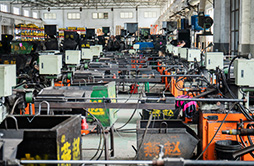aluminum carriage bolts factory
Nov . 25, 2024 04:59 Back to list
aluminum carriage bolts factory
The Importance of Aluminum Carriage Bolts in Modern Manufacturing
Aluminum carriage bolts are an essential component in various construction and manufacturing applications. Known for their strength, durability, and resistance to corrosion, aluminum carriage bolts are becoming increasingly favored by manufacturers across different sectors. This article explores the significance of aluminum carriage bolts, their manufacturing processes, and their advantages over traditional materials.
Understanding Aluminum Carriage Bolts
Carriage bolts, often characterized by their rounded heads and square necks, are designed to be used in wood and metal applications. The square neck prevents rotation when the nut is tightened, creating a secure fastening. While traditionally made from steel, aluminum carriage bolts are gaining popularity due to their unique properties.
Manufacturing Process
The manufacturing of aluminum carriage bolts involves several key steps. Initially, high-quality aluminum alloy is selected for its lightweight and strength characteristics. The aluminum is then heated and extruded into the desired shape. After extrusion, the bolts undergo a precision machining process where threads and heads are formed. This meticulous process ensures that each bolt meets the stringent quality standards required for various applications.
Once the shaping and machining are complete, aluminum carriage bolts are often treated with anodization or other surface protection methods to enhance their resistance to corrosion. This step is particularly important for bolts that will be exposed to outdoor environments or harsh conditions. Finally, the bolts are packaged and distributed to manufacturers and construction firms around the world.
Advantages of Aluminum Carriage Bolts
1. Lightweight Aluminum carriage bolts are significantly lighter than their steel counterparts. This feature is particularly advantageous in industries where weight reduction is crucial, such as aerospace and automotive manufacturing.
aluminum carriage bolts factory

2. Corrosion Resistance One of the standout benefits of aluminum is its inherent corrosion resistance. Aluminum's oxide layer helps protect it from degradation, making it ideal for projects that require long-lasting fasteners in humid or corrosive environments.
3. Strength-to-Weight Ratio Aluminum boasts an excellent strength-to-weight ratio, meaning it provides substantial strength while remaining lightweight. This quality makes it suitable for high-stress applications where traditional materials may be too heavy or impractical.
4. Aesthetic Appeal Aluminum carriage bolts can have a sleek and polished appearance, making them suitable for visible applications in architectural projects or furniture construction where aesthetics are important.
5. Recyclability Aluminum is one of the most recycled materials in the world. Utilizing aluminum carriage bolts aligns with sustainability goals and helps reduce the overall carbon footprint of manufacturing processes.
Applications
Aluminum carriage bolts find applications in a wide range of industries, from construction and automotive to furniture manufacturing and marine applications. Their versatility allows them to be used in securing wooden structures, assembling metal frameworks, and even in fastening systems for outdoor furniture where exposure to the elements is a concern.
Conclusion
In summary, aluminum carriage bolts represent a significant advancement in fastening technology. Their unique properties—lightweight, corrosion resistance, strength, aesthetic appeal, and recyclability—make them a preferred choice among manufacturers seeking reliable and efficient fastening solutions. As industries continue to prioritize sustainability and performance, the demand for aluminum carriage bolts is expected to grow, solidifying their place as a vital component in modern manufacturing and construction.
Latest news
-
High-Quality Panel Stud Bolt Reliable Panel Stud Bolt Factory & Suppliers
NewsJul.08,2025
-
High-Precision Fine Thread Locknuts Manufacturer & Supplier Custom Solutions
NewsJul.08,2025
-
PH Imperial Stud Bolt – High Strength Fasteners from Leading Supplier & Factory
NewsJul.07,2025
-
High-Quality Allen Wrench Bolts Leading Factory, Company & Suppliers
NewsJul.07,2025
-
Wholesale Ball Stud Bolt - High Quality Supplier & Factory Price Reliable Wholesale Ball Stud Bolt Company
NewsJul.06,2025
-
High-Strength Alloy Bolts Manufacturer & Supplier Quality Alloy Fasteners Factory
NewsJul.06,2025
